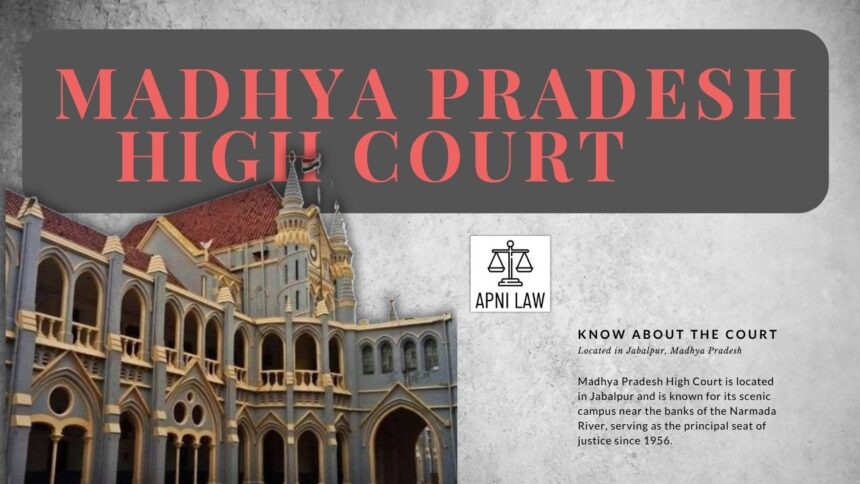Introduction
The Madhya Pradesh High Court, in a significant ruling delivered by Justice Vishal Dhagat and Justice Anuradha Shukla, granted divorce to a husband under Section 13(1)(ia) of the Hindu Marriage Act, 1955. The Court held that a wife’s act of attempting self-immolation and falsely accusing her in-laws of causing her injuries amounted to mental cruelty. This judgment reversed the family court’s earlier decision, which had dismissed the husband’s divorce petition.
Facts of the Case
The marriage between the parties took place on April 29, 2003, and the couple had one daughter. After marriage, the husband claimed that his wife’s behavior underwent a drastic change. He alleged that she attempted to set herself on fire on two separate occasions. In the first incident, she set her clothes on fire, and in the second, she poured kerosene on herself in another attempt at self-immolation. The husband also claimed that his wife deserted him without any reasonable justification and refused to live with him.
The wife, in her defense, accused her in-laws of causing her injuries and blamed them for her attempts at self-harm. Despite making these serious allegations, she did not lodge any criminal complaint against them. She also failed to produce credible witnesses or documentary evidence to support her version of events. The family court originally dismissed the husband’s petition for divorce on grounds of cruelty, finding insufficient proof in his claims. Dissatisfied with this outcome, the husband challenged the decision before the High Court.
What the Court Says
The Madhya Pradesh High Court carefully reviewed the evidence and concluded that the wife’s actions amounted to mental cruelty. The judges observed that attempting self-immolation was a dreadful act that inflicted deep psychological suffering on the husband and his family. Such behavior not only disrupted the peace of the matrimonial home but also created an atmosphere of fear and instability.
The Court noted that the wife had accused her in-laws of causing her injuries but had taken no steps to pursue criminal action or present reliable proof. This lack of legal initiative indicated that her allegations lacked substance and were not made in good faith. The Court emphasized that unfounded accusations, especially against a spouse’s relatives, cause immense damage to marital relations and cannot be treated lightly.
The judges clarified that mental cruelty is not limited to physical assaults or overtly violent behavior. It also includes conduct that creates constant mental agony, humiliation, or emotional strain for the other spouse. In this case, the wife’s repeated acts of self-immolation and her false accusations clearly crossed the threshold of cruelty under Section 13(1)(ia) of the Hindu Marriage Act.
The High Court held that the family court failed to appreciate the seriousness of these acts and wrongly dismissed the husband’s petition. Correcting this error, the High Court reversed the lower court’s order and granted the husband a decree of divorce.
Implications
This ruling has far-reaching implications for matrimonial law and the concept of cruelty in divorce proceedings. By recognizing self-harm combined with false accusations as mental cruelty, the Court expanded the scope of what can constitute a valid ground for divorce. The decision makes it clear that cruelty is not confined to physical violence but extends to behavior that causes psychological damage and disrupts the marital bond.
One important implication of this judgment is its emphasis on the need for evidence and legal action when serious allegations are made. The wife in this case accused her in-laws of grave misconduct but failed to file a police complaint or initiate any criminal case. The Court treated this failure as proof that her allegations were not genuine. This sends a strong message that parties in matrimonial disputes cannot rely on unsubstantiated claims to strengthen their position. Allegations must be backed by proof, or they risk being treated as acts of cruelty themselves.
From a societal perspective, the judgment serves as a warning against the misuse of allegations in marital conflicts. Matrimonial disputes often involve accusations against spouses and their families, but this case makes it clear that false or reckless claims can backfire. The ruling may discourage individuals from making unfounded statements in the heat of conflict and encourage them to pursue genuine grievances through proper legal channels.
Finally, the judgment strengthens the position of individuals who feel trapped in marriages due to repeated acts of reckless behavior by their partners. It reaffirms that the law values mental health and dignity within marital relationships. By granting divorce on these grounds, the Court set a precedent that future cases can rely on when dealing with similar acts of cruelty.
Conclusion
The Madhya Pradesh High Court’s ruling demonstrates that self-immolation attempts and false allegations against relatives constitute mental cruelty under matrimonial law. By reversing the family court’s decision and granting divorce, the Court reinforced the importance of evidence, truthfulness, and responsibility in marital disputes. The judgment expands the legal definition of cruelty, ensuring that psychological harm receives equal recognition alongside physical abuse. Its implications extend beyond this case, shaping the future of divorce law in India and protecting spouses from the devastating impact of reckless and unfounded conduct.







